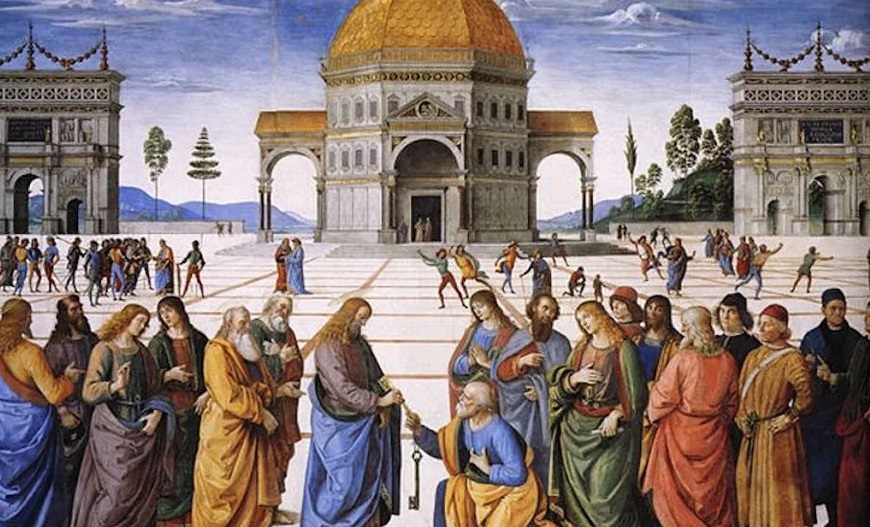Vatican revives reflection on Pope’s role among other Christians
On June 13, the Vatican published a document on papal primacy, a central concept that designates the pre-eminence of the pope in the Church.
Jun 29, 2024

By Loup Besmond de Senneville
On June 13, the Vatican published a document on papal primacy, a central concept that designates the pre-eminence of the pope in the Church. This idea has been hotly contested since the fourth century and central to many theological battles, including the Protestant Reformation. However, after reading the 150 pages of a text soberly titled The Bishop of Rome, published by of the Dicastery for Promoting Christian Unity, these centuries-old battles now seem more distant than ever.
Twenty-five years after St John Paul II published Ut Unum Sint (That They May Be One), the Vatican sought to renew dialogue among all Christian traditions, whether Orthodox, Protestant, or Anglican. To this end, Rome offered an exhaustive analysis of nearly 100 documents published over the past quarter-century by non-Catholic Churches or ecumenical dialogue groups. A form of consensus emerged around the necessity of a papal primacy at the universal level.
Today’s world requires Christianity to have a sort of spokesperson
In other words, Christian leaders worldwide now recognise the need for the Pope to play a specific role. This is justified in three points. The first is historical: “Christianity was organised on major apostolic sees occupying a specific order, the see of Rome being the first in the hierarchy,” the document stated, summarising the reflections of the past 25 years.
The second justification is ecclesiological: “A number of dialogues have maintained that there is a mutual interdependency of primacy and synodality at each level of the life of the Church: local, regional, but also universal.” The third argument is more pragmatic: some Churches, like those of the Anglican tradition, recognise that today’s world demands that Christianity have a sort of spokesperson in a “contemporary context of globalisation” and on “missionary requirements.”
Divergent views on the papal primacy
However, despite this consensus, not everyone agrees on the content of this primacy of the Bishop of Rome. For other Christian Churches, it is out of the question that the Pope regains a form of dominion over them. One of the most debated principles in ecumenical terms is the legacy of the First Vatican Council in 1870, during which the Catholic Church proclaimed as dogma “the pope’s primacy over the universal Church,” establishing for the Bishop of Rome a “primacy of jurisdiction over the entire Church of God.” This vision significantly evolved less than a century later when the Second Vatican Council introduced the principle of collegiality, which Rome particularly insists on today.
“The ministry of the Bishop of Rome need not be seen only as a problem but also as an opportunity for a common reflection on the nature of the Church and its mission in the world,” the Vatican wrote while urging theologians to revisit Vatican I. Similarly, the Dicastery for Promoting Christian Unity clarified the dogma of papal infallibility, which was also proclaimed in 1870, explaining that it should be interpreted more as “the infallibility of the Church” and not merely that of a man, even if he is the pope.
An opportunity for a common reflection on the nature of the Church
The role of primacy corresponding to several actions Francis took since the beginning of his pontificate, would thus be considered a “primacy of charity.” “Peter’s role in strengthening the brethren (Luke 22:32) is a leadership of service grounded in the consciousness of his own weakness and sinfulness,” the document stated, adding: “This ministry is inextricably bound up with the self-emptying and self-sacrifice of Christ.”
Once the document is published, it remains to be seen how this enthusiastic assessment by Roman theologians will evolve. Although the Dicastery for Promoting Christian Unity has delivered the fruits of two years of work, it does not intend to stop there. All Christian Churches are now called to respond to this vision. And to answer, fundamentally, this underlying question: Is it acceptable, or is it still too Catholic? It’s a way to continue the dialogue and perhaps one day reach a true theological agreement on the role of the Bishop of Rome in Christianity.
New Ecclesiological Perspectives
Excerpt from “The Bishop of Rome, Primacy, and Synodality in Ecumenical Dialogues” (§32)
“Theological reflection on primacy cannot relate only to the dogmatic differences of the past but should also reflect on the present life of our churches – their internal developments, challenges, and relationships. Regarding the internal life of the Catholic Church, the renewed practice of the Synod of Bishops or the emphasis of Pope Francis on the title of “Bishop of Rome,” among other aspects of reform, are ecumenically significant. (…) In this regard the “dialogue of love” and the “dialogue of life” should not be understood only as a preparation for the “dialogue of truth”, but as a theology in action, capable of opening up new ecclesiological perspectives.” -- LCI (https:// international.la-croix.com/)







Total Comments:0